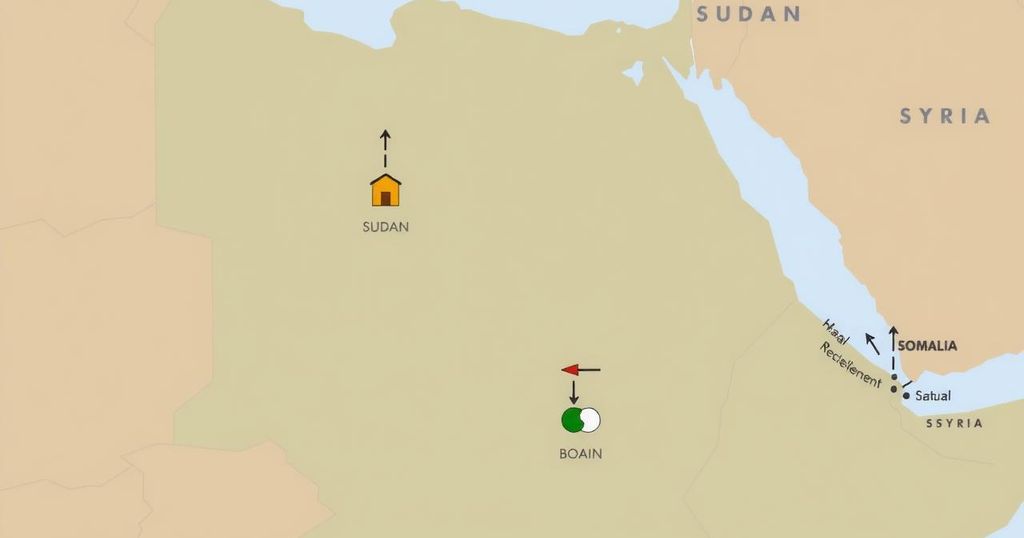U.S. and Israel Explore Resettlement of Gazans in Sudan, Somalia, and Syria

The U.S. and Israel are considering Sudan, Somalia, and Syria for resettling Gazans, following discussions initiated by the Trump administration. This initiative is aimed at resolving the conflict and rebuilding Gaza, despite concerns over its implications. Trump’s comments about the potential permanence of such a resettlement plan have received widespread condemnation, framing the discussions within a contentious political landscape.
The United States and Israel are reportedly exploring Sudan, Somalia, and Syria as potential resettlement locations for Gazans, as part of a strategy to resolve the ongoing conflict between Israel and Hamas. Sources familiar with the matter indicate that this initiative is tied to President Trump’s broader objectives concerning Gaza’s reconstruction.
During a recent Oval Office meeting, President Trump addressed inquiries about his earlier comments suggesting the U.S. might assume control over Gaza. He emphasized that “Nobody is expelling any Palestinians,” seeking to clarify his intentions surrounding the potential resettlement of Palestinians.
In past statements, Mr. Trump described Gaza as having the potential to become the “Riviera of the Middle East” and expressed that surrounding countries with humanitarian capacities could assist in relocating the 1.8 million Palestinians currently in the enclave. Reports suggest that diplomatic communications have occurred between U.S. and Israeli officials and the governments of Sudan and Somalia regarding this matter.
Furthermore, the Trump administration has shown an interest in Syria for this resettlement plan, with attempts made to connect with Syria’s interim government. However, some officials have denied knowledge of such communications, including Somalia’s ambassador, who warned about the dangers of misinformation potentially benefiting extremist groups.
The humanitarian situation in countries like Sudan and Somalia remains complex, with Sudan facing civil unrest and Somalia struggling with insurgency. President Trump’s administration has suggested that any departure of Palestinians from Gaza could be permanent, a notion that sparked condemnation from various Arab nations and the United Nations, who accused the U.S. of endorsing ethnic cleansing.
Former officials from President Biden’s administration had engaged with Syrian counterparts prior to the change in administration, but these contacts ceased with the new leadership. While Trump’s comments have incited criticism, there remains an active discussion regarding the fate of displaced Palestinians in regional contexts.
As Israeli actions in Syria persist, including airstrikes linked to the ongoing conflict, the U.S. State Department has continued its diplomatic efforts towards establishing a workable ceasefire. Additionally, the pursuit of new policies aimed at improving life for Gazans remains a priority for Middle Eastern special envoy Steve Witkoff, who hinted at exploring relocation options beyond the region.
Amidst these developments, far-right elements in Israel have been vocal about ambitions to relocate Palestinians as part of a broader national security strategy. Reports have surfaced suggesting that discussions have even included Jared Kushner mentioning the potential value of Gaza’s real estate, indicating a continuing focus on the area. The Associated Press was the first to disclose these talks concerning the resettlement of Gazans in Sudan, Somalia, and Somaliland.
In summary, the U.S. and Israel are investigating options for resettling Palestinians from Gaza in countries like Sudan, Somalia, and Syria as part of a plan to alleviate the humanitarian crisis in the region. President Trump’s administration has been promoting this idea despite criticism labeling it as ethnic cleansing. Furthermore, the ongoing conflict in Gaza highlights the significant challenges involved in finding a sustainable solution for displaced Palestinians while navigating complex geopolitical landscapes. The dialogues regarding these potential resettlement strategies continue to evoke a range of responses from various stakeholders.
Original Source: www.cbsnews.com








